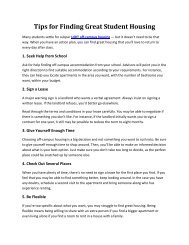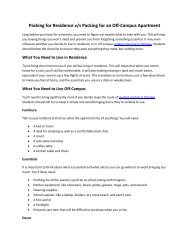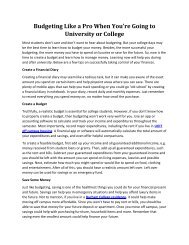What To Consider Before Changing Your College Or University Major
There are many factors that must be considered before choosing a new major to fit your interests, aptitudes and goals.
There are many factors that must be considered before choosing a new major to fit your interests, aptitudes and goals.
Create successful ePaper yourself
Turn your PDF publications into a flip-book with our unique Google optimized e-Paper software.
<strong>What</strong> <strong>To</strong> <strong>Consider</strong> <strong>Before</strong> <strong>Changing</strong> <strong>Your</strong> <strong>College</strong> <strong>Or</strong><br />
<strong>University</strong> <strong>Major</strong><br />
Choosing a university or college major is a big decision, and it’s not always one that students<br />
stick with. Exposure to new and interesting courses, unhappiness or difficulty completing<br />
course work can cause some students to reconsider their area of study, but there are many<br />
factors to consider before choosing a new major – here are some to get you started.<br />
<strong>What</strong> Does the New Program Entail?<br />
When a degree program isn’t what they expected, some students rush to find a new program<br />
and, therefore, do little research into the new field of study. If the new program comes with<br />
unpleasant surprises, is difficult or makes you unhappy, you might need to change majors again<br />
– a process that can be daunting, time consuming and costly. <strong>To</strong> avoid making the same<br />
mistake twice, do your due diligence. This includes:<br />
<br />
<br />
<br />
<br />
Understanding the course requirements and workload<br />
Researching career development and progression in your chosen field<br />
Understanding the job options for graduates with your degree<br />
Checking job prospects, possible internships and the availability of jobs in your market
Looking at starting salaries, average salaries and low-end and high-end salaries in your<br />
possible career fields<br />
Why do You Want a Different <strong>Major</strong>?<br />
<strong>Before</strong> changing your major, think deeply about why you want and need to change. A<br />
complicated or frustrating course, heavy course load and/or a ‘bad’ professor isn’t a reason to<br />
make the switch. Never decide to change your major when you’re feeling unhappy, stressed or<br />
angry. Plus, ill-feelings about your current degree program isn’t a solid reason to make a switch.<br />
<strong>To</strong> make an informed decision, do your research and write down the pros and cons of your<br />
current field of study. Additionally, ask yourself some questions to reveal how you really feel<br />
about your major. For example:<br />
<br />
<br />
<br />
<br />
<br />
Are the classes, coursework or job prospects different than what you expected? Are<br />
they worse?<br />
Specifically, what don’t you like about the program? <strong>What</strong> do you like?<br />
Have your interests changed?<br />
Is their any coursework or focus in the program that interests you? <strong>What</strong> doesn’t<br />
interest you?<br />
Ask yourself similar questions about the majors you’re considering. Ultimately, the<br />
answers to these questions could help you create a clear image of the major that’s right<br />
for you.<br />
<strong>Your</strong> Year of Study<br />
Switching fields of study in the middle of your college or university career means more time and<br />
more money. Fortunately, there’s a solution for those who are past the mid-point in their<br />
programs; instead of changing majors, find an independent study or obtain a minor or double<br />
major. On<br />
How Well You’re Performing Academically<br />
For students, academic performance is often a measure of happiness. It’s easy to be unhappy<br />
with your field of study when you’re failing or generally not performing well. In actuality, if<br />
you’re finding that your coursework is too difficult, this may be a very good reason to change<br />
your major. If you’re doing well in your classes, weigh the benefits and drawbacks, research and<br />
consider all your options before switching. Remember, having a solid academic foundation<br />
gives you options and the ability to explore other areas of interest.<br />
How it Will Affect Graduation
In many ways, starting a new degree program is starting over. <strong>Changing</strong> majors could affect<br />
when you graduate. <strong>To</strong> start a new program, you will need to take entry-level classes and<br />
maybe even some prerequisites. This means more time spent meeting degree requirements<br />
and getting to a level where you’re eligible and competent enough to graduate from your new<br />
program. It also might mean more time spent in school.<br />
There’s much to consider when it comes to switching your major. Speak to your academic<br />
advisors to learn about your options and to find a solution that’s the best fit not only for what<br />
interests you but also what makes the most sense financially and in terms of time.<br />
If you haven’t already, now’s the time to book a tour of some of the best student housing<br />
Oshawa has to offer. Village Suites Oshawa was designed with students in mind – come and<br />
see it for yourself!

















